General
AAP Delegation meets Mak Management: Commits to strengthening partnerships and building strong research institutions in Africa
Published
1 year agoon
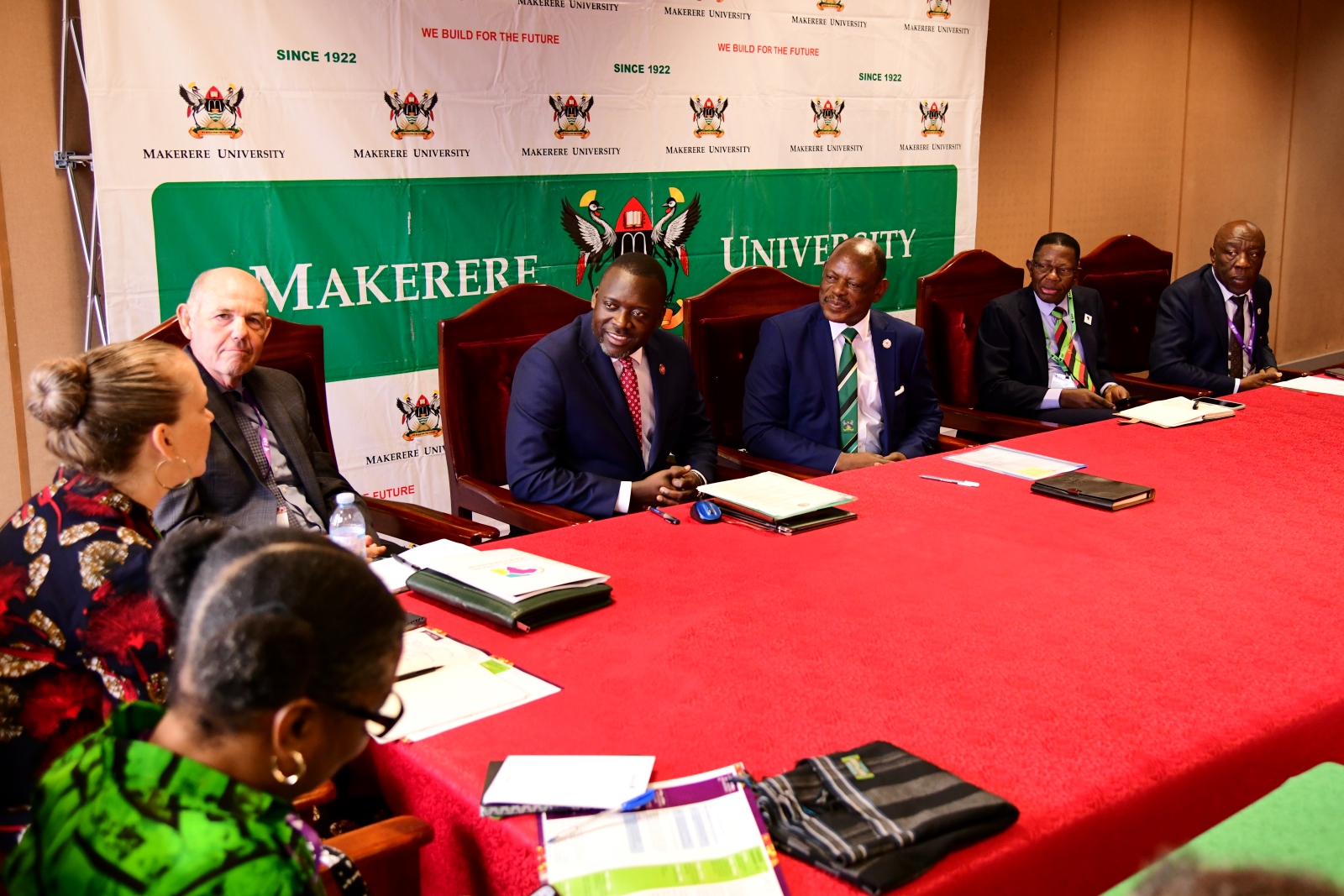
On Tuesday 10th September 2024, a powerful delegation from the Alliance for African Partnership (AAP) held a strategic meeting with Makerere University Management aimed at strengthening partnerships and building a strong research network on the African continent.
Both parties underscored the need to tap into internationalization of higher education, building global students through co-teaching, digitization of education and learning different cultures, leveraging on existing competencies in member institutions to raise the research profile in Africa, as well as conducting trainings and mentorship programmes to empower researchers to acquire relevant and competitive skills and knowledge aligned to the demands of the research environment.
The call to action for AAP Consortium Members focuses on ensuring that the valuable research networks contribute to research impact, which entails research uptake so that research benefits communities in Africa.
About AAP and the Meeting
Founded by Michigan State University (MSU) in 2016 in collaboration with African colleagues, the Alliance for African Partnership (AAP) is a consortium of 10 leading African universities, a distinguished research network for African research institutes, and Michigan State University (MSU) that builds on MSU’s over 60-year history of collaborating with African institutions. Its goal is to co-create innovative solutions to global challenges with its members working collaboratively with other international partners to transform lives in Africa.
This year, Makerere University– a member of AAP hosted the AAP Consortium Meeting from 9th to 11th September 2024. As part of this agenda, a strategic meeting involving AAP Consortium participants and Makerere University Management was scheduled. The aim of the meeting was to have a focused and interactive discussion on deepening collaboration in areas of interest namely research, teaching and learning, research funding opportunities, winning and attracting research grants, and re-committing to the AAP Priority areas.
The AAP Priority Areas include: Education; Agri-food systems; Water, Energy and Environment; Youth Empowerment; Health and Nutrition; Science, Technology and Innovation; Gender and Inclusion; and Culture and Society.
The Mak-MSU Strategic Meeting
Highlighting that AAP, Michigan State University and Makerere University have been working together for long time, Dr. Amy Jamison, Co-Director, AAP said the strategic meeting presented an opportunity to anchor the spirit of partnership across the different colleges and disciplines.
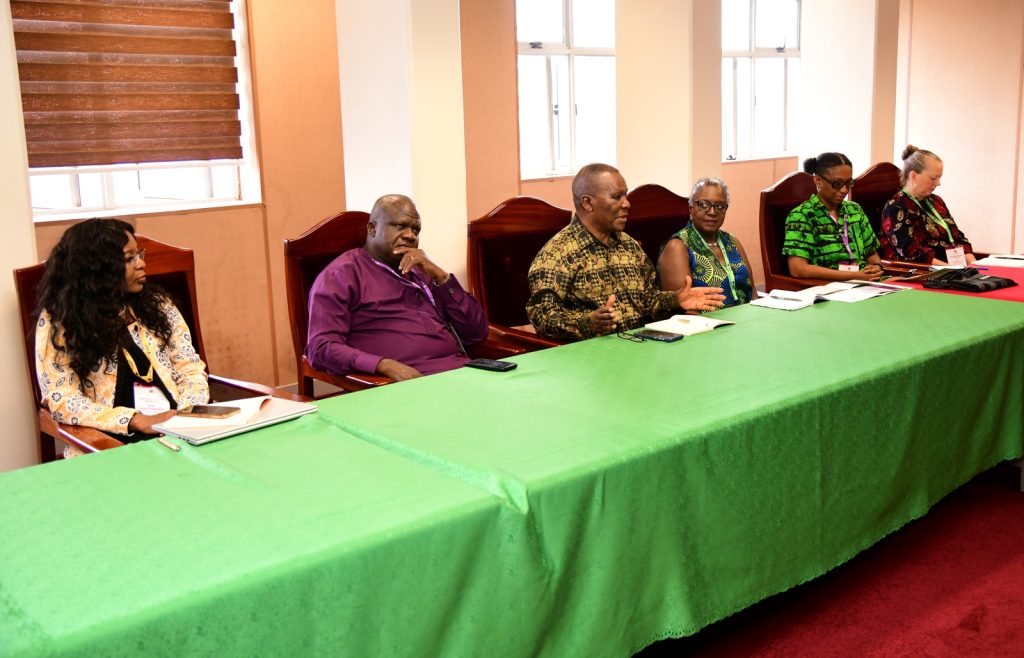
“We are here at Makerere University to strengthen our partnership, re-commit to working together and to ensure that Makerere University leadership across the Colleges are aware of the AAP work.”
To supplement this submission, Dr. Jose Jackson another Co-Director emphasized that AAP facilitates research growth among consortium members, presents mentorship opportunities and has special programmes targeting early career researchers.
Prof. Titus Awokuse, Associate Dean for Research and Strategic Partnerships, International Studies and Programs, MSU stated that AAP provides a platform to develop research of faculty through provision of mentorship opportunities to early career faculty on how to publish their research in internationally recognized journals and how to apply for external grant funding. He further urged Makerere University to harness its leadership of the higher education sector to remain at the forefront of advocating for research.
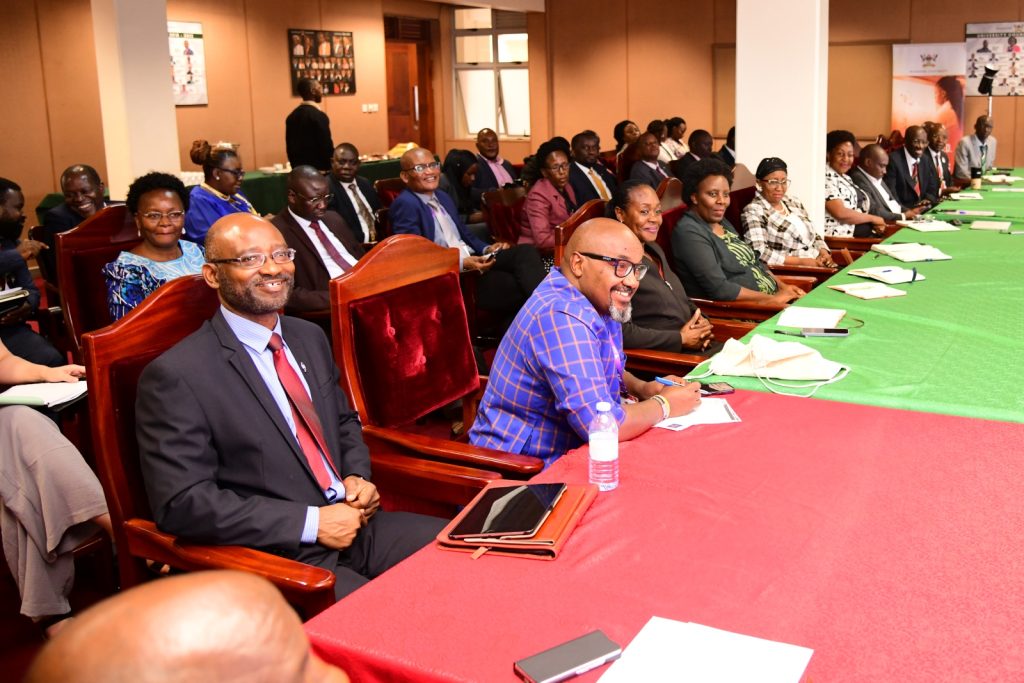
The Vice Chancellor’s Remarks
The Vice Chancellor of Makerere University, Prof. Barnabas Nawangwe also Chair of the AAP Advisory Board welcomed the delegates to the special session with Management. He articulated that the work of AAP is aligned to the internationalization agenda of the University and its strategic direction of being a research-led institution.
Prof. Nawangwe asserted that through enhanced research collaboration, AAP and Makerere University will continue to provide evidence based solutions to the development challenges in Africa.
“Through the AAP, we are convinced that we will be strong in building valuable research networks in Africa and be in position to respond to the World Bank recommendation of producing 100,000 PhDs in Africa in the near future,” said Prof. Nawangwe.
Sharing his lived experience with the AAP delegates, Prof. Nawangwe explained that the world expects research from universities to impact their day to day lives. He then revealed a question that he was asked during one of the engagements with the Government of Uganda. “If we have a number of people with PhDs, why are Ugandans still suffering from hunger?” Prof. Nawangwe who admitted that this question still challenges him to-date, underscored the need for PhDs that contribute to the transformation of the agricultural sector. He added that research networks such as the RUFORUM and AAP are empowering researchers and faculty to respond to this question and solve the puzzle.
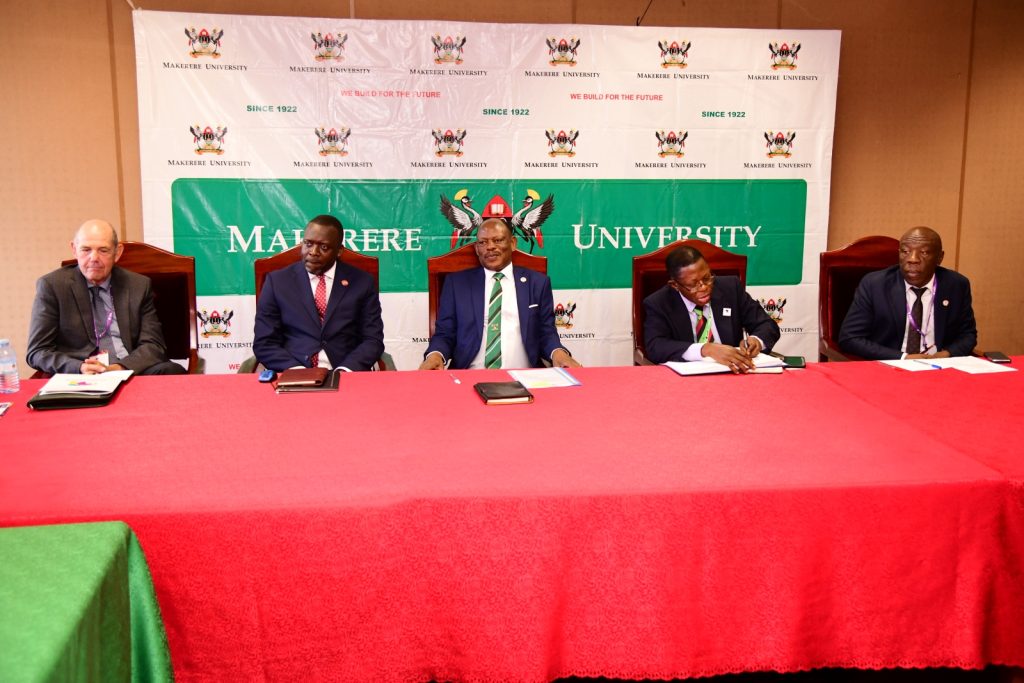
Responding to the discussion on research impact and the need for Makerere to be at the forefront of advocating for research, the Vice Chancellor informed the AAP delegates that the University is committed to leveraging the power of research to contribute to the transformation of lives on the African continent. “To realize this agenda, the University Strategic Plan provides a platform to transform into a research-led institution. Consequently, restructuring of university processes is being undertaken to feed into the research led agenda,” he stated.
On strengthening Makerere’s Research, Grant Writing and Publication Capacity, the Vice Chancellor explained that the University Writing Centre has been institutionalized to provide the required support. Makerere University is implementing this project in collaboration with Michigan State University’s Writing Centre and AAP.
With the AAP bringing on board 10 universities in Africa, the Vice Chancellor informed the delegates about the Makerere University Rotary Peace Centre. This first Rotary Peace Center on the African Continent offers Postgraduate Diploma in Peace-building, Conflict Transformation, and Development under the Peace and Conflict Studies (PCS) Program.
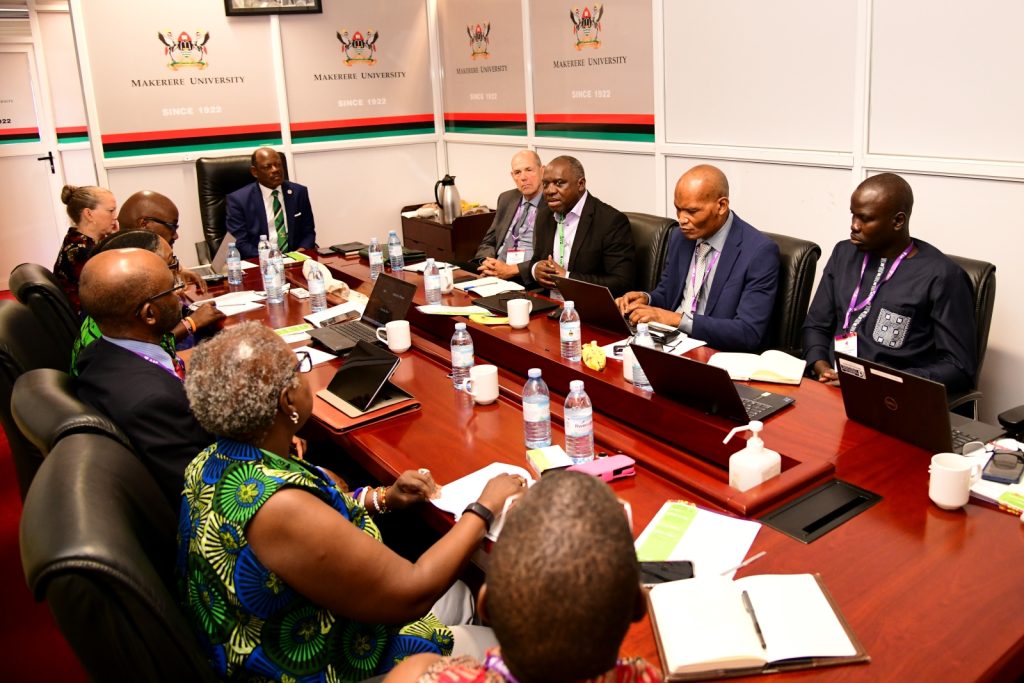
Championing Innovation through the Mak UniPod
In line with the AAP Youth Empowerment Priority area, the Vice Chancellor pointed out that the Makerere University Innovations Pod had been set up with support from UNDP. The Pod, he added, presents students and young people with an opportunity to think, innovate and incubate ideas into businesses and enterprises, thereby empowering them to become job creators, innovators and entrepreneurs.
The Chairperson of the Steering Committee of Mak Innovations Pod, Prof. Gorettie Nabanoga further explained that the Mak UniPod is a dynamic physical hub and cultural melting pot that fosters innovation among students, faculty, and external individuals, regardless of their academic backgrounds. She went on to add that it provides a supportive environment where participants can tap into their creative potential to develop solutions.
Prof. Nabanoga elaborated that whether through individual exploration or collaborative efforts across various academic disciplines, the Mak UniPod promotes effective ideation through programs that are designed to systematically encourage regular co-creation of innovative solutions to societal challenges. “The Mak UniPod cultivates a vibrant ecosystem of innovation, entrepreneurship, and collaboration within the university community and beyond” she summed up.
Members of Management have their say
The University Secretary, Mr. Yusuf Kiranda disclosed that through benchmarking AAP and its partners, Makerere University has operationalised its Grants Management Policy, and established the Grants Administration and Management Support Unit (GAMSU). The policy and structures, he noted have been central in providing a framework for attracting and winning research grants.
The Vice Chancellor then invited Members of Makerere University Management to share some experiences and success stories aligned to the Mak-AAP-MSU partnership.
The Principal, College of Veterinary Medicine, Animal Resources and Bio-security (CoVAB), Prof. Frank Mwiine urged the participants to tap into youth empowerment, which is one of the AAP priority areas. Prof. Mwiine advocated for student exchanges and mobility among AAP Member institutions so that students are exposed to different learning environments, technologies and cultures.
With regard to the Gender and Inclusion priority area, Ms Susan Mbabazi highlighted that the Directorate of Gender Mainstreaming continues to champion for gender equity, women empowerment and access to higher education. She also informed the meeting that the Directorate holds sensitization meetings and trainings for staff and students aimed at fighting against gender based violence. She particularly pointed out zero tolerance to sexual harassment, and explained that the Directorate implements the Makerere University Policy and Regulations Against Sexual Harassment. She expressed readiness of GMD to work with AAP to contribute to the Gender and Inclusion priority area.
In the area of human rights, the Deputy Principal at the School of Law Dr. Zahara Nampewo shared that the Human Rights and Peace Centre (HURIPEC), a semi-autonomous centre of the School of Law, created in 1993 conducts research and advocacy in the area of human rights. HURIPEC, she added, publishes a bi-annual journal, the East African Journal on Peace and Human Rights, and has led many rights and governance related projects over the years. A notable and on-going initiative is a project titled “Charcoal Conflict in Climate Change’s Decarbonisation Dilemmas: Knots of Livelihood, Nutrition, Communities, Gender, Migration and Energy in East Africa”, which is examining the social conflicts that top-down changes to the charcoal value chains in Uganda and Tanzania cause. The project will contribute to the discourse on local processes of transition and options to peaceful and equitable pathways to energy transitions. In her view, this was an area that the AAP could build on especially by widening the interdisciplinary perspectives to this critical issue.
The Vice Chancellor mentioned that the College of Agricultural and Environmental Sciences (CAES) is one of the academic units at Makerere University that has significantly benefited from the partnership with MSU.
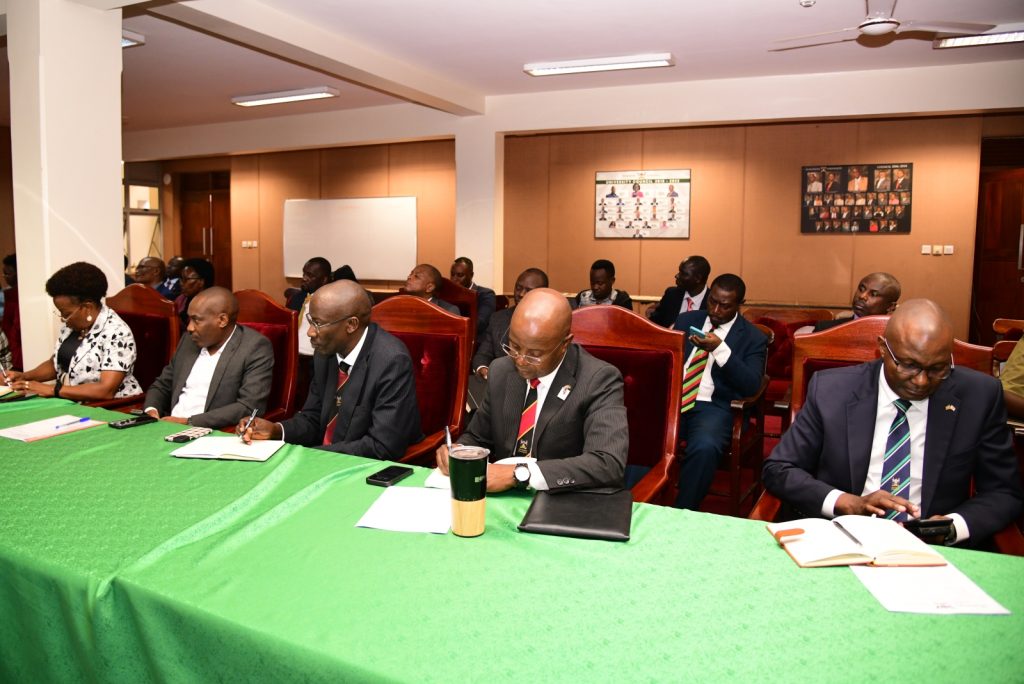
To elaborate this, the Principal of CAES, Prof. Gorettie Nabanoga shared some compelling success stories. She noted that CAES, in collaboration with MSU’s Borlaug Higher Education for Agriculture Research and Development (BHEARD) Program, and with support from MSU’s Global Center for Food Systems Innovation (GCFSI), implemented the CAES Innovation Scholars Program (CAES-ISP). This program provided an opportunity for CAES academic staff to work in interdisciplinary teams to address food system challenges relevant to Africa. Additionally, it supported the CAES leadership in fostering a stronger culture of innovation within the college. The program fostered human-centered design thinking among scholars and also supported scholars to spearhead the institutionalization of the innovation culture in CAES. The Scholars’ program supported eight academic staff participating in a Faculty Track and four academic staff participating in a Top Management Track.
Dr. Julia Kigozi, one of the faculty track scholars, led a project focused on developing innovative technology for medium, small, and micro enterprises (MSMEs) in the food industry. The goal was to enhance Makerere University‘s capacity to support MSMEs by providing low-cost, accessible equipment and infrastructure, enabling them to compete in domestic, regional, and international markets. The project resulted in the design of a batch pasteurizer and pulper tailored to the diverse needs of agro-processors. These technologies offered affordable solutions optimized for individual processors, directly benefiting agro-processors by improving their access to suitable equipment.
Prof. Nabanoga disclosed that the Human-Centered Design thinking introduced by CAES-ISP led to a shift in the training and course delivery approaches at the College from instructor-centered learning to learner-centered, work-integrated training. This approach emphasizes ‘learning through problem-solving,’ ‘curiosity-driven inquiry,’ experiential learning, and ‘theory improvement inquiry,’ with academic staff and industry practitioners serving as facilitators.
Prof. Nabanoga equally shared that CAES is leveraging the Mak UniPod to foster interdisciplinary collaborations between agricultural scientists, environmental experts, and innovators from other fields to develop cutting-edge solutions for food security, climate change, and sustainability challenges. She highlighted that faculty and students are utilizing the Mak UniPod’s design thinking framework to approach complex agricultural problems from a human-centered perspective, integrating technology and local knowledge.
The Mak UniPod serves as a platform for prototyping and testing eco-friendly agricultural practices and products, encouraging hands-on experimentation. By hosting workshops and hackathons focused on agricultural innovation, it engages the CAES community in active problem-solving. Additionally, CAES is using the Mak UniPod to forge partnerships with entrepreneurs and industry professionals, bridging academic research with real-world applications. Further, the Mak UniPod’s collaborative environment promotes the exchange of ideas, enhancing CAES’s role in addressing societal challenges through innovation.
The Principal, College of Business and Management Sciences (CoBAMS) and former Director of Research and Graduate Training, Prof. Edward Bbaale underscored that since the university is prioritizing the setting up of research centres at the different colleges, the Makerere University Writing Centre will play a pivotal role in strengthening the research capacities and competences of researchers and faculty.
The meeting ended on a high note with participants reflecting on the need to undertake deliberate capacity building programmes targeting units that support research centres/institutes within universities so that they are empowered to deliver as per the expectations.
Discussions conclude on a high
Wrapping up the interactive session, MSI’s Dr. Amy Jamison commended the University Management for the fruitful deliberations and extended an invitation to the University Management members to join the AAP Public Dialogue that was scheduled to begin at 2:00pm that same day at the School of Public Health Auditorium.
You may like
-


Celebrating Academic Excellence: CoBAMS Presents 975 Graduands at Mak 76th Graduation Ceremony
-


Medical graduates urged to uphold Ethical values
-


CAES Presents Overall Best Performing Student in the Sciences & a Record 28 PhDs at the 76th Graduation Ceremony
-


Graduation marks the next phase of accountability, graduates told
-


Over 9,200 to graduate at Makerere University’s 76th Graduation
-


76th Graduation Highlights

It is with great pleasure that I welcome you to this edition of Mak News Magazine, a publication that continues to chronicle Makerere University’s journey as a centre of academic excellence, innovation, and societal transformation.
The stories featured in this issue vividly demonstrate Makerere’s unwavering commitment to addressing national, regional, and global challenges through research, partnerships, and people-centred solutions. They reflect a university that is deeply engaged with society, one that applies knowledge not only to advance scholarship, but also to improve lives.
A recurring theme in this edition is innovation for resilience and inclusion. From the College of Agricultural and Environmental Sciences’ Healthy Soy Initiative combating child malnutrition amid climate change, to the cutting-edge work of CEDAT’s Team Green Minds integrating IoT into agriculture, Makerere continues to harness science and technology to respond to pressing development needs. Equally inspiring is the College of Natural Sciences’ success in securing international funding to scale up fish processing technologies, with a deliberate focus on empowering women and strengthening livelihoods.
This issue also highlights Makerere’s growing role in advancing health and wellbeing. The launch of the Early Intervention Psychiatry Services Clinic at Makerere University Hospital marks an important step in strengthening mental health services, while the Hospital’s transformation from a modest sickbay into a centre of excellence stands as a testament to decades of strategic investment, dedication, and service to the nation.
Our commitment to education access and global engagement is equally evident. Strategic partnerships, such as that between the College of Education and External Studies and the Uganda Vocational and Technical Assessment Board, are expanding pathways to quality education. The establishment of the first-ever United States Studies Centre in the Great Lakes Region positions Makerere as a hub for dialogue, research, and policy engagement on global affairs. We also celebrate our vibrant international community, with graduates drawn from 67 nationalities—affirming Makerere’s status as a truly global university.
This edition further showcases initiatives that ensure long-term institutional sustainability, including the launch of the CoCIS Endowment Fund, infrastructure developments such as the modern hostel at Buyana Farm, and transformative programmes supported by the Mastercard Foundation that continue to empower young people across the continent.
As you read through these pages, I invite you to reflect on the collective effort of our students, staff, alumni, partners, and supporters whose contributions make these achievements possible. Together, we continue to shape Makerere University as a place where knowledge serves humanity.
I wish you an engaging and inspiring read.
Prof. Barnabas Nawangwe
VICE CHANCELLOR

The Board Chairperson of the Makerere University Endowment Fund (MakEF), Dr. Margaret Blick Kigozi, has urged graduands in Health and Life Sciences to uphold professional ethics and serve humanity with diligence and compassion.
Her appeal came during the passing out of graduates from the College of Natural Sciences (CoNAS), the College of Veterinary Medicine, Animal Resources and Bio-Security (CoVAB), the College of Health Sciences (CHS) and the School of Public Health (SPH) on Day Two of the 76th Graduation Ceremony of Makerere University.
“Class of 2026, you are now part of the Makerere legacy. Wherever you go clinics, laboratories, farms, boardrooms, or classrooms, you carry this institution with you. Serve your patients with skill and compassion. Care for animals and communities responsibly. Question boldly and keep learning,” Dr Kigozi, said.
Delivering the commencement address, Dr. Kigozi lauded the graduates for their dedication to careers that directly impact lives and communities. She encouraged them to use their knowledge generously and exercise their power gently.
“Your education has trained you to ask better questions. Your humanity must guide the answers. Never forget that behind every chart, every case, every animal, every experiment, there is life. And life deserves care, patience, and dignity. Give every person you come in contact with care, patience and dignity,” Dr Kigozi, noted.
As the graduates embark on their professional journeys, Dr. Kigozi emphasized the importance of cultivating basic business acumen and financial literacy to ensure sustainability in their work.

“You do not need to become accountants but you must be able to read the essentials: understand simple financial statements, budgets and key metrics so you can judge whether a clinic, lab, or program is sustainable. You are encouraged to start your business. There are numerous investment opportunities in your areas of training. You can provide services to our people and create jobs,” Dr Kigozi, said.
She shared candidly how, when she first stepped into leadership, she realised she did not understand balance sheets or budgets well enough. So, she returned to Makerere for short courses to strengthen herself.
“A well-run Hospital, clinic or lab delivers better outcomes, attracts staff, and secures funding. Business savvy is not only about profit, it’s about sustainability and the freedom to serve ethically and effectively. Carry clinical skill with business sense so your work endures and grows,” Dr. Kigozi, noted.
Quoting renowned writer and producer Shonda Rhimes, creator of Grey’s Anatomy, who once reflected that succeeding in one area of life can sometimes mean falling short in another, Dr. Kigozi encouraged women graduates to intentionally balance professional ambition with family responsibilities.
“When one area thrives, another is often under strain. When Navio was graduating from school I had to manage the Presidential Investor Round Table on the same day as Executive Director Uganda Investment Authority. I chose my job and delegated his siblings to attend Navios graduation. I learnt from this. I choose family always after that thing you achieve once and keep forever,” Dr Kigozi, said.
In his speech, the Prof Barnabas Nawangwe, the Vice Chancellor, informed the congregation that Makerere’s ranking on all university ranking platforms has remained stable, placing Makerere among the top 10 African universities and within the top 4.5% globally.
“In the Times Higher Education global ranking, Makerere University made a formidable jump from the 1200-1500 bracket to the 800-1000 bracket. This was no mean achievement and I congratulate all members of the Makerere Community on this stellar performance,” Prof Nawangwe, said.
General
Graduation marks the next phase of accountability, graduates told
Published
3 days agoon
February 25, 2026
“A degree is not a finish line. Graduation is not the end of learning, It is the beginning of accountability,” Prof. Nicholas Ozor, the Executive Director of the African Technology Policy Studies Network Nairobi, Kenya (ATPS), said.
Delivering a keynote address under the theme ‘Knowledge with purpose’, during Makerere University’s 76th graduation ceremony on Tuesday 24th February, Prof Ozor, challenged graduates to see their degrees not as status symbols, but as instruments of responsibility.
In his speech, he painted a candid picture of the world the graduates are stepping into, one marked by climate change, technological disruption, inequality, food insecurity and the rapid spread of misinformation. Yet rather than framing these challenges as obstacles, he described them as opportunities for purposeful leadership.
“Into this world, you step, armed with knowledge, credentials, and potential. Your degrees do not make you better than others. They make you responsible for others,” Prof Ozor, said.
Addressing graduands from College of Agricultural and Environmental Sciences (CAES)
College of Computing and Information Sciences (CoCIS), College of Education and External Studies (CEES) and School of Law (SoL), Prof. Ozor tailored his message to each field of study.
To graduates of the School of Law, he described the legal profession as a moral calling, urging them to use the law to protect the vulnerable and uphold justice with courage.
“Uganda, Africa, and the world do not need lawyers who only know how to argue. They need lawyers who know why they argue. Use the law to protect the weak, not intimidate them. Use your knowledge to defend justice, not delay it. Let integrity define your reputation not merely your résumé,” Prof Ozor, said.
For graduands who might feel that shortcuts will be tempting and silence will feel safer than truth, Prof. Ozor reminded them that justice does not need clever people, but courageous ones.
To the College of Education and External Studies, he underscored the transformative power of teachers, reminding them that classrooms shape nations long before policies do.
“Every nation rises and falls on the quality of its teachers. Never underestimate the power of a classroom. Teach not only for examinations, but for understanding. Teach not only content, but character. Teach learners how to think not what to think. Education is quiet work but its impact echoes across generations,” Prof Ozor, noted.
He called upon graduands from the College of Computing and Information Sciences, to use technology to solve African problems, not merely to imitate foreign solutions.
“Technology is powerful, but it is not neutral. Every line of code carries values. Every system you design affects real lives. Build for inclusion. Build for accessibility. Build for truth. Do not let innovation outrun ethics. The future will not belong to those who know the most technology, but to those who use it wisely,” He noted.
During the ceremony, Prof Ozor announced that the African Technology Policy Studies Network is offering PhD scholarships and postdoctoral fellowships in Artificial Intelligence, inviting deeper collaboration with Makerere.
For graduates of the College of Agricultural and Environmental Sciences, he highlighted their critical role at the intersection of sustainability and survival, calling on them to blend indigenous knowledge with scientific innovation to secure Africa’s food systems and protect its ecosystems.
In closing, he reminded graduands that their integrity will open doors their degrees cannot, their humility will teach them lessons success never will, and their resilience will matter more than their grades.
Five principles to be remembered:
- Embrace lifelong learning. The world changes too fast for static knowledge.
- Choose purpose over comfort. Impact matters more than income.
- Build character before career. Skills get you hired; character sustains you.
- Serve something larger than yourself. Give back to your communities and your country.
- Believe in Africa, and act. Do not wait for solutions from elsewhere. Be the solution.
Trending
-

 Humanities & Social Sciences5 days ago
Humanities & Social Sciences5 days agoMeet Najjuka Whitney, The Girl Who Missed Law and Found Her Voice
-

 Health1 week ago
Health1 week agoUganda has until 2030 to end Open Defecation as Ntaro’s PhD Examines Kabale’s Progress
-

 Agriculture & Environment1 week ago
Agriculture & Environment1 week agoUganda Martyrs Namugongo Students Turn Organic Waste into Soap in an Innovative School Project on Sustainable Waste Management
-

 General4 days ago
General4 days ago76th Graduation Highlights
-

 General1 week ago
General1 week agoMastercard Foundation Scholars embrace and honour their rich cultural diversity
